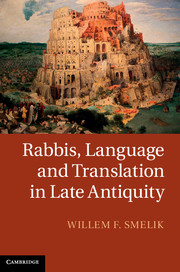Book contents
- Frontmatter
- Dedication
- Contents
- List of figures and tables
- Acknowledgements
- List of abbreviations
- Note on manuscripts and editions
- Introduction
- I Multilingualism and the holy tongue
- 1 The family of languages
- 2 The holy tongue
- 3 The multilingual context of language selection
- II The locus of translation
- III Rabbis and translation
- Conclusion
- Appendix
- Bibliography
- Index of texts
- Index of subjects
3 - The multilingual context of language selection
from I - Multilingualism and the holy tongue
Published online by Cambridge University Press: 05 December 2013
- Frontmatter
- Dedication
- Contents
- List of figures and tables
- Acknowledgements
- List of abbreviations
- Note on manuscripts and editions
- Introduction
- I Multilingualism and the holy tongue
- 1 The family of languages
- 2 The holy tongue
- 3 The multilingual context of language selection
- II The locus of translation
- III Rabbis and translation
- Conclusion
- Appendix
- Bibliography
- Index of texts
- Index of subjects
Summary
Over seven centuries, Roman Palestine staged Aramaic, Greek and Hebrew as Jewish languages besides several minority languages such as Nabataean, Phoenician, Latin, Arabic, Armenian and Georgian. The pre-Roman intersection of administrative and cultural languages with local vernaculars would remain characteristic for the Ancient Near East in general and Roman Palestine in particular. While the Romans used Latin for internal official communication throughout their empire, they did not impose their own language upon any of their subjects but published their imperial decrees in Greek, the new lingua franca in the Eastern part of the Empire where hardly any province was monolingual.
The multilingual context is manifestly relevant for the rabbinic views on the uses of language in Jewish society and influenced early rabbinic thought, as we have already had occasion to see. First, the rabbis accorded each language a meaningful place in the family of languages, subsumed under Hebrew as the mother of all languages, with acute relevance for the interpretation of the Hebrew Bible. Second, the rabbis considered the notion of the holy tongue a prerequisite for a surprisingly limited number of rituals, although over time the idea gained prominence whilst the positive appreciation of non-Hebrew languages, as well as the use of phonetic etymologies, would dissipate (later midrashim repeat earlier instances but do not create new ones).
Information
- Type
- Chapter
- Information
- Rabbis, Language and Translation in Late Antiquity , pp. 100 - 138Publisher: Cambridge University PressPrint publication year: 2013
